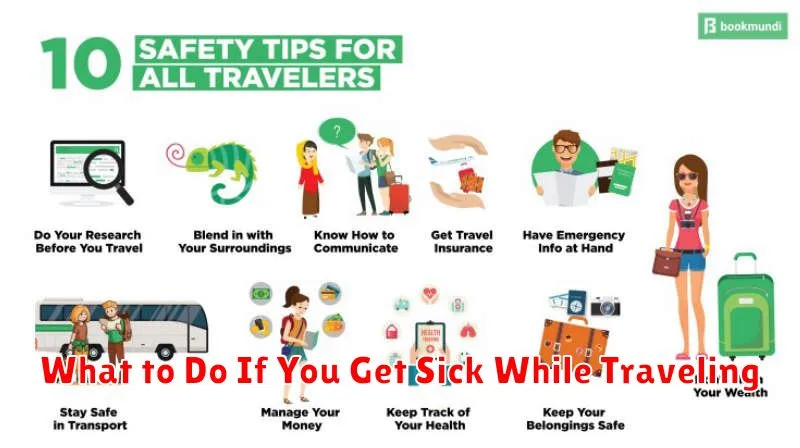Traveling can be a thrilling experience, offering opportunities to explore new cultures, enjoy breathtaking scenery, and create unforgettable memories. However, falling ill while traveling can quickly derail your plans and turn your dream vacation into a stressful ordeal. It’s crucial to be prepared for potential health issues that may arise when you’re away from home. This article will provide essential guidance on what to do if you get sick while traveling, covering everything from common ailments like traveler’s diarrhea and motion sickness to more serious health emergencies. Knowing how to address illness and injury when you’re in an unfamiliar environment is essential for a safe and enjoyable trip. Understanding how to navigate medical care in a foreign country, managing travel insurance, and taking preventative measures can significantly impact your experience should you experience health problems abroad.
Whether you’re embarking on a short weekend getaway or a long-term backpacking adventure, being aware of potential health risks is paramount. From understanding the importance of travel vaccinations and packing a comprehensive first-aid kit to knowing how to find a reputable doctor or hospital in a foreign country, preparation is key. This guide offers practical advice and actionable steps to take if you experience sickness while traveling, helping you to minimize disruption and ensure you can continue your journey as smoothly as possible. Learn how to differentiate between minor travel ailments and more serious conditions that require immediate medical attention, and discover valuable tips on mitigating risks and safeguarding your health while abroad. Don’t let illness ruin your trip; empower yourself with the knowledge to manage health issues effectively and confidently while traveling.
Recognizing Symptoms Early
Being aware of potential illness symptoms while traveling is crucial for prompt action. Early recognition can help prevent complications and minimize the impact on your trip. Pay close attention to any changes in your body.
Common travel-related illnesses often manifest with general symptoms such as fever, chills, headache, muscle aches, fatigue, and gastrointestinal upset like nausea, vomiting, or diarrhea. Respiratory issues like coughing, sore throat, or runny nose can also signal illness.
More serious symptoms, such as difficulty breathing, chest pain, severe headache, persistent vomiting, or high fever, require immediate medical attention. Don’t hesitate to seek help if you experience anything concerning. Early intervention is key.
Be mindful of the specific health risks associated with your destination. Researching potential illnesses common in the area you’re visiting can help you recognize symptoms more quickly. For example, some regions are prone to mosquito-borne illnesses like malaria or dengue fever, which present with specific symptoms. Being informed is your best defense.
Visit a Local Clinic or Hospital
If your symptoms worsen or become concerning, seek professional medical attention. Visit a local clinic or hospital. This is especially important if you experience severe symptoms such as high fever, difficulty breathing, or persistent vomiting.
Be prepared to describe your symptoms clearly and accurately. Mention any pre-existing medical conditions and medications you are currently taking. Bring your passport and any travel insurance information you have with you.
Depending on the severity of your illness and the local healthcare system, you may be able to visit a walk-in clinic for minor ailments. For more serious conditions, you might need to go to a hospital emergency room.
In some countries, medical costs can be substantial. It’s wise to confirm your insurance coverage beforehand and understand any potential out-of-pocket expenses. Keeping receipts for medical services and medications is crucial for insurance claims.
Use Your Travel Insurance Benefits

If you experience a medical emergency or unexpected illness during your trip, promptly contact your travel insurance provider. Timely reporting is crucial for a smooth claims process. Have your policy number ready and provide detailed information about your situation. Your insurer can guide you to appropriate medical facilities and assist with direct billing, reducing your out-of-pocket expenses.
Understand your policy’s coverage for medical expenses, including doctor visits, hospitalization, prescription medications, and emergency medical evacuation. Some policies may also cover trip interruption or cancellation due to illness, allowing you to recoup prepaid, non-refundable expenses. Keep all receipts and documentation related to your medical care and any additional expenses incurred due to the disruption.
Be aware of any pre-existing condition exclusions or limitations within your policy. Providing accurate health information during the purchase of your insurance is essential to avoid claim denials. If you have questions about your coverage or encounter difficulties with your claim, don’t hesitate to contact your insurance provider directly for clarification and assistance.
Stay Isolated If Contagious

If you test positive for a contagious illness, especially one that spreads through the air, it’s crucial to prioritize the health of those around you by isolating yourself. This means staying in your accommodation and avoiding contact with others as much as possible.
Isolate yourself for the recommended period. Consult local guidelines or a healthcare professional for the most up-to-date advice on isolation durations. This helps prevent further transmission of the illness.
If you’re sharing accommodation, inform your travel companions immediately so they can take appropriate precautions. If possible, arrange for separate sleeping arrangements and minimize shared spaces.
Inform hotel staff or your host about your situation so they can take necessary cleaning and sanitation measures to protect other guests or residents. Consider ordering contactless room service for meals and other necessities to limit interactions.
Notify Accommodation and Travel Partners
If your illness necessitates changes to your travel plans, promptly inform your accommodation and travel partners. This includes hotels, airlines, cruise lines, or tour operators. Early notification allows them to adjust arrangements and potentially offer alternative options, such as rebooking or refunds. It also minimizes the impact on other travelers and allows them to prepare accordingly.
Provide specific details regarding your situation, including the nature of your illness, confirmation of any medical diagnoses, and any anticipated changes to your itinerary. Be polite and understanding, recognizing that disruptions may cause inconvenience. Keep records of all communications for reference, including confirmation numbers, email correspondence, and the names of individuals you speak with.
Review the cancellation policies of your bookings to understand potential financial implications and eligibility for refunds or rebooking options. Travel insurance often provides coverage for medical emergencies and trip interruptions, so be sure to contact your insurance provider as soon as possible if you have a policy. Provide them with all necessary documentation, including medical reports and travel confirmations.
Document Everything for Insurance Claims
Thorough documentation is crucial for successful travel insurance claims. Keep all relevant paperwork organized and easily accessible.
Retain all original receipts for medical expenses, transportation, lodging, and any other unexpected costs incurred due to your illness. This includes doctor’s visit summaries, prescriptions, medical test results, and ambulance bills. If you need to alter your travel plans due to your illness, keep records of flight or train changes and any additional accommodation expenses.
Create a detailed log of your experience. Document the onset of your symptoms, the dates and times you sought medical attention, and the names and contact information of any medical professionals you consulted. Note any advice or instructions they gave you.
If your illness resulted from an accident or specific incident, gather any supporting evidence such as police reports or witness statements, if applicable. The more comprehensive your documentation, the stronger your insurance claim will be.
Prepare a Medical Travel Kit in Advance
Being prepared for unexpected illnesses is crucial for a smooth trip. Packing a well-stocked medical travel kit before you depart can significantly ease your worries and help you manage common ailments effectively. This kit should supplement, not replace, necessary medical insurance.
Essential medications should always be included. This includes any prescription drugs you regularly take, ensuring you have enough to last beyond your trip’s duration. Over-the-counter medications for common travel ailments like headaches, allergies, motion sickness, indigestion, and pain relief are also recommended.
First-aid supplies are another important component. Pack antiseptic wipes, bandages, gauze, medical tape, and a small pair of scissors. Include a thermometer, tweezers, and a basic first-aid manual for quick reference. Don’t forget essentials like hand sanitizer and insect repellent.
Consider adding items specific to your destination or personal needs, such as altitude sickness medication if traveling to mountainous regions or oral rehydration salts for destinations with a higher risk of traveler’s diarrhea.

